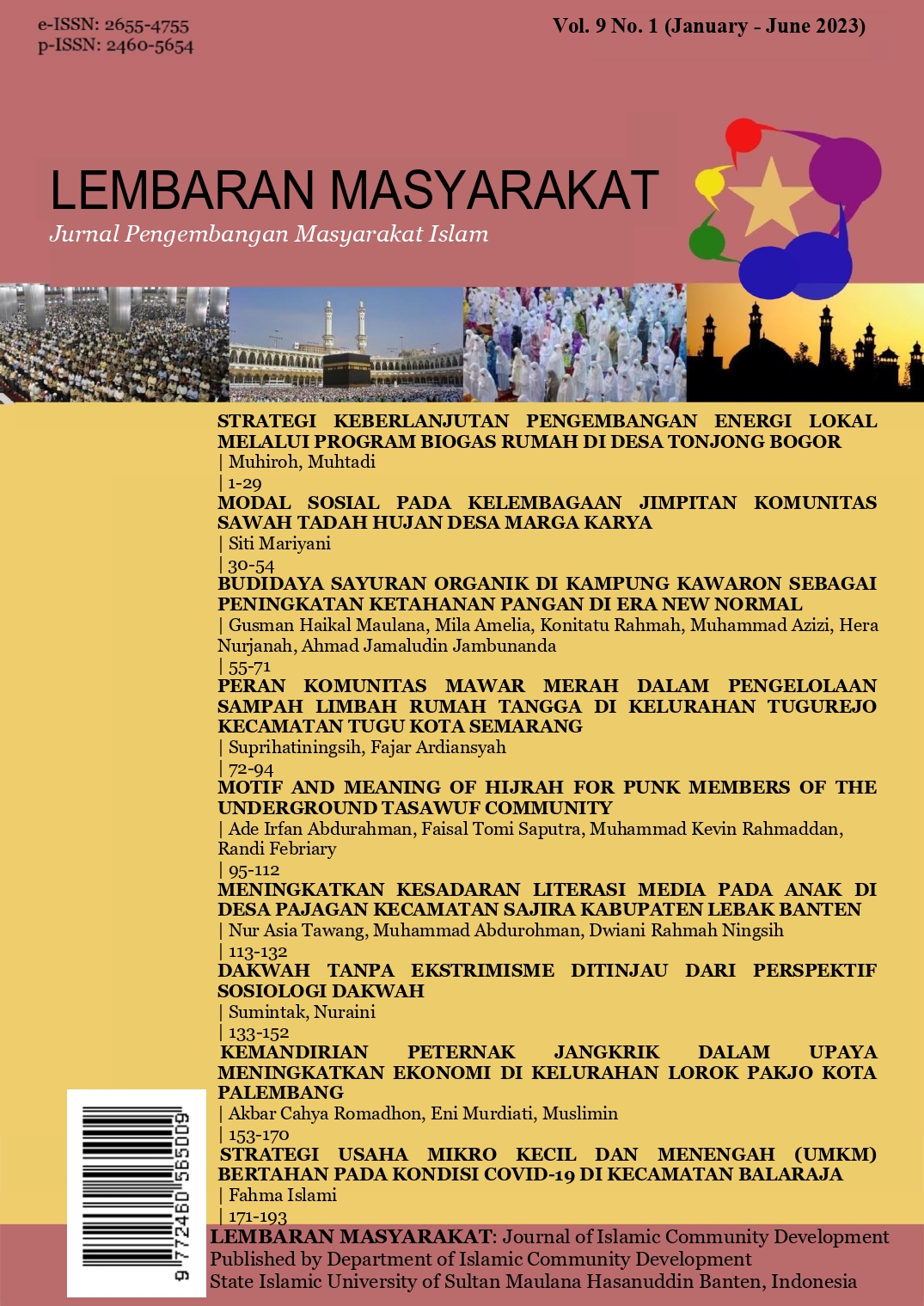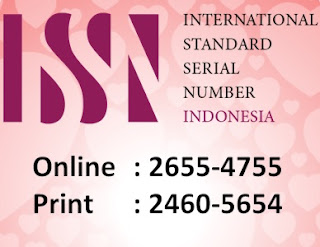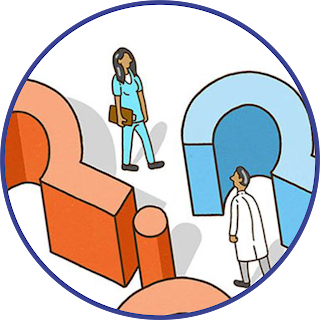STRATEGI KEBERLANJUTAN PENGEMBANGAN ENERGI LOKAL MELALUI PROGRAM BIOGAS RUMAH DI DESA TONJONG BOGOR
DOI:
https://doi.org/10.32678/lbrmasy.v9i1.8202Abstract
The study is backfaced by the limited and costly sources of cooking energy in Indonesia and the ephesically inadequate stockpile of cattle dung. Yayasan Rumah Energi (YRE) created a social program to minimize the problem, one of which is a Biogas Rumah program (BIRU). The purpose of this research was to learn YRE sustainability strategies through the BIRU program, contributing factors and BIRU program in hibitors in the village of Tonjong Bogor. The study in this time involves qualitative research methods, the techniques used of observation, interviews, the study of documentation, and the use of data validity data triangulation. Based on field findings, it may be known that YRE sustainability strategies through the BIRU program are found in 3 aspects, which are 1) Economic sustainability, 2) Environmental sustainability, and 3) Social sustainability. The results of this study are YRE sustainability strategies found in 3 aspects, 1) Economic sustainability, empowering communities through biogas and bio-slurry and producing domessomen. 2) Environmental sustainability, propagating biogas instead of petroleum and gas. 3) Social sustainability, giving knowledge about biogas and opening jobs in the construction field. The underlying factors are the availability of the main ingredients in biogas production, the availability of land to build biogas reactors and the support of governments and other agencies. While the constraining factor is the absence of the cost of building biogas reactors, the lack of interest in people using biogas, and some governments still do not support it.
Downloads
References
Al Batistuta, R. A., Darmawan, A. H., & Yulian, B. E. (2021). Analisis Keberlanjutan Biogas Skala Mikro di Pedesaan (Studi Kasus di Kabupaten Bandung, Provinsi Jawa Barat). Ilmu Lingkungan, 189.
Bogor, K. T. (2019). Desa Tonjong. Dipetik Februari Minggu, 2023, dari Kecamatan Tajurhalang, Kabupaten Bogor https://kecamatantajurhalang.bogorkab.go.id/desa/170
Emerseon, E., Syarief, R., & Asmara, A. (2020). Strategi Keberlanjutan Pemanfaatan Biogas Industri Tapioka di PD XYZ. Manajemen IKM, 87-92.
Energi, Y. R. (2022). https://www.rumahenergi.org/tentang-rumah-energi/nilai-nilai-rumah-energi. Retrieved Oktober Minggu, 2022, from Google.com.
H. E. (2020, Juli Jum'at). Strategi Pengembangan Biogas Kejar Target Bauran Energi. Retrieved November Minggu, 2022, from ebtke.esdm.go.id: https://ebtke.esdm.go.id/post/2020/07/06/2579/strategi.pengembangan.biogas.kejar.target.bauran.energi
Hadiwijoyo, & Anisa. (2019). Perencanaan Pembangunan Daerah. Depok: PT Raja Grafindo Persada.
Handy, F. (2001). Advocacy by environmental non-profit organizations: An optimal strategy for addressing environmental problems? International Journal of Social Economics, 648.
Hernimawati. (2018). Model Implementasi Kebijakan Penataan Reklame. Jakarta: Jakad Media Publishing.
Hidayati, N. (2006). Metodologi Penelitian Dakwah dengan Pendekatan Kualitatif. Jakarta: Lembaga Penelitian dan UIN Jakarta Press.
Inayah, N. (2022). Strategi Keberlanjutan Program Keluarga Harapan (Studi Kasus: Program Keluarga Harapan Di Kecamatan Tamansari, Kabupaten Bogor). Jakarta: Institutional Repository UIN Syarif Hidayatullah Jakarta.
Mardikanto, T., & Soebiato, P. (2013). PEMBERDAYAAN MASYARAKAT Dalam Perspektik Kebijakan Publik. Bandung: ALFABETA.
Moleong, & J, L. (2007). Metode Penelitian Kualitatif. Bandung: Pt Remaja Rosdakarya.
Muhtadi, & Hermansah, T. (2013). Manajemen Pengembangan Masyarakat Islam (PMI). Ciputat: UIN Jakarta Press.
Muhtadi, & Nabilah, N. (2021). Peran Kelompok Tani Dewasa Lemah Duhur Dalam Pemberdayaan Masyarakat Untuk Pengembangan Lingkungan Melalui Kampung Agro Eduwisata Organik Ciharashas (Studi Kasus Kelurahan Mulyaharja, Kecamatan Bogor Selatan, Kota Bogor). Agribisnis Terpadu, 166.
Nasir, M. (1998). Metode Penelitian. Jakarta: Ghalia Indonesia.
Sedarmayanti. (2014). Manjemen Strategi. PT Refika.
Steinner, G., & Minner, J. (2002). Manajemen Startejik. Jakarta: Erlangga.
Sugiyono. (2014). Memahami Penelitian Kualitatif. Bandung: Alfabeta.
Sugiyono. (2018). Penelitian Kuantitatif, Kualitatif, dan R&D (28th ed). Bandung: Alfabeta.
Sukandarrumidi. (2012). Metodologi Penelitian. Yogyakarta: Gajah Mada University Press.
Sukandarrumidi; Kotta, Herry Dzardak; Wintolo, Djoko. (2013). Energi Terbarukan Konsep Dasar Menuju Kemandirian Energi. Yogyakarta: Gadjah Mada University Press.
Triwahyuni, A., Hanafi, I., & Yanuwiadi, B. (2015). Strategi Keberlanjutan Pemanfaatan Energi Alternatif Biogas di Desa Argosari Jabung Kabupaten Malang. J-PAI, 157.
Ulum. (2018). Perilaku Organisasi Pemberdayaan. Malang: UB Press.
Umamy, K. (2018). Peran Humanist Institute For Co-operation with Developing Countries (HIVOS) Dalam Mengembangkan Energi Lokal Berkelanjutan melalui Program Biogas Rumah di Indonesia Periode 2009-2013. Global Political Economy, 2.
Wibowo, H. (2018). Model dan Penelitian Pembelajaran Bahasa Indonesia. Jakarta: Puri Cipta Media.
Wulandari, M. (2016). Respon Masyarakat Dalam Pemanfaatan Biogas Sebagai Energi Alternatif Di Desa Tarumajaya, Kecamatan Kertasari, Kabupaten Bandung, Jawa Barat. Ciputat: Institutional Repository UIN Syarif Hidayatullah Jakarta.
Downloads
Published
Issue
Section
License
Copyright (c) 2023 Lembaran Masyarakat: Jurnal Pengembangan Masyarakat Islam

This work is licensed under a Creative Commons Attribution-NonCommercial 4.0 International License.









.png)
.png)
.png)

.png)











